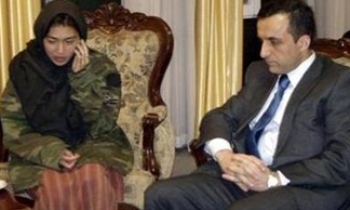MADRID (Reuters) - Spies and soldiers, politically engaged and deeply partisan -- such is the way a new exhibition portrays some of the intriguing band of foreign correspondents who risked their lives to report on the Spanish Civil War.
It is well known that novelists like George Orwell, Ernest Hemingway and John Dos Passos wrote in defence of Spain's Republican government troops as they battled General Francisco Franco's rebel troops between 1936-39.
However, history has sometimes forgotten the contributions of ordinary war reporters and that many British and American newspapers once championed Franco even as he was aided by Hitler and Mussolini.
Run by the socialist cultural centre, the Pablo Iglesias Foundation, along with the Cervantes Institute, the exhibition being held in Merida, Spain, and in Lyon, France, includes newspaper clippings from countries like America, Britain, France and Russia.
Jay Allen, who wrote for the Chicago Tribune, was the first foreign reporter to interview Franco.
"For that the Francoists were out to get him. He accurately reported Franco saying that he would happily shoot half of Spain if necessary," said historian Paul Preston, one of the leading authorities on modern Spanish history.
Preston is set to publish We Saw Spain Die: Foreign Correspondents in the Civil War -- inspired by the Spanish exhibition, which he helped promote, and a New York exhibition called Facing Fascism: New York and the Civil War.
EVERYBODY'S FIGHT
"The bulk of the reporters became so committed to the Republic, partly because of the horrible things they saw such as the bombing of civilians, but even more so because they felt that what was going on in Spain was everybody's fight," said Preston.
"If fascism won in Spain, they felt the next thing it would be bombing Paris and London, which of course was true."
"Did the fact that they got involved imply in a way that they were not good journalists?" asks Preston. "Absolutely not."
George Steer, a special correspondent for The Times, wrote one of the most historically important reports of the war -- describing the bombing of the Basque town of Guernica by Franco's troops using Nazi planes in April 1937.
"When the writer visited the town, the whole of it was a horrible sight, flaming from end to end", he wrote.
Allen chronicled Franco's victorious invasion of Badajoz and the reprisals which followed.
"This was the upshot -- thousands of republican, socialist and communist militiamen and militiawomen were butchered after the fall of Badajoz for the crime of defending their republic against the onslaught of the generals and the land owners.
"Between 50 and 100 have been shot every day since," he wrote.
FRANCO'S FRIENDS
In stark contrast, the British Daily Mail's Harold Cardozo portrayed Franco and his troops as heroes defending Spain against communism.
His description of the rebel troops holding onto Toledo despite a 70-day siege by the Republicans contained one particularly striking anecdote for the history books.
According to Cardozo, the son of the commander of the Alcazar fortress was captured and held hostage but failed to give in to threats. The commander told his son:
"I order you, in the name of God, to call out 'Long Live Spain; Long Live the Christ-King,' and then die like a hero, Your father will never surrender'."
Orwell said many reports of the war were invented such as "all those hecatombs of nuns who have been raped and crucified before the eyes of 'Daily Mail' reporters."
As well as writing for The New English Weekly, Orwell was one of a number of reporters who went beyond the role of foreign correspondent, enlisting with the non-Stalinist left-wing POUM as an infantryman.
TAKING UP ARMS
He was shot in the neck by a sniper in May 1937 and had to leave Spain after narrowly escaping being arrested as a "Trotskyite" when the communists moved to suppress the POUM.
Another reporter, Harold "Kim" Philby, for The Times was also no mere correspondent. Exhibition curator Carlos Garcia Santa Ceilia says there is evidence he was already working as a British spy.
Since many commentators believe Britain's "Third Man" was recruited as a double agent for Russia in the 1930s, it is conceivable he was also in the pay of Stalin.
His reports, though, won communist-hating Francoists over. After Philby survived a near-miss in which his car was hit by Republican fire, killing another two journalists, Franco gave him a medal.









